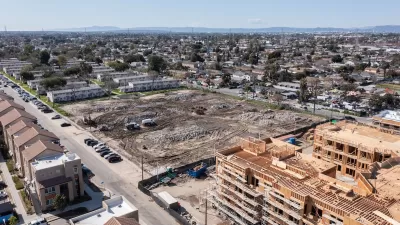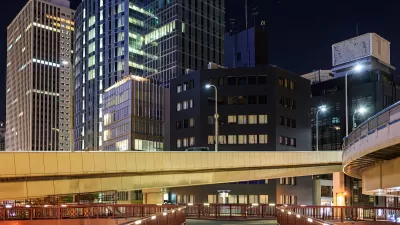AB 2243 paves the way for easier conversion of industrially and commercially zones properties for residential development.

In an analysis for The National Law Review, Brooke Miller outlines the potential impacts of California Assembly Bill 2243, which was signed into law by Governor Gavin Newsom last month.
The law expands the type of sites eligible for expedited approvals, adding regional mall properties of up to 100 acres that could help make larger multifamily developments with affordability requirements more financially feasible. The law also allows development within 500 feet of a freeway (previously prohibited), provided that the development takes steps to improve air quality.
According to Miller, “AB 2243 also provides some relief from the strict minimum density requirements of AB 2011, instead designating the “allowable” density- but still requires projects to meet at least 50% of the allowable density (75% for sites within ½ mile of an existing rail or bus rapid transit station) through 2026; after January 1, 2027, 75% is the minimum.”
AB 2243 also addresses a provision that usually requires developers to add common open space to new residential development, recognizing that the physical limitations of a site can make meeting that requirement challenging. “For both conversion and redevelopment projects, AB 2243 also limits mitigation fees to the incremental impact of the development, in recognition that the existing use likely already contributed to mitigating some development impacts.”
AB 2243 adds more qualifying “surrounding urban uses” to free up more sites for housing development. “AB 2243 also takes aim at AB 2011’s exclusion for sites in a “neighborhood plan”, which can work against a project in an outdated community plan area or a jurisdiction with few areas outside such planning boundaries.”
FULL STORY: State of Conversion: Update on Adaptive Reuse and Conversion Legislation

Alabama: Trump Terminates Settlements for Black Communities Harmed By Raw Sewage
Trump deemed the landmark civil rights agreement “illegal DEI and environmental justice policy.”

Planetizen Federal Action Tracker
A weekly monitor of how Trump’s orders and actions are impacting planners and planning in America.

The 120 Year Old Tiny Home Villages That Sheltered San Francisco’s Earthquake Refugees
More than a century ago, San Francisco mobilized to house thousands of residents displaced by the 1906 earthquake. Could their strategy offer a model for the present?

LA’s Tree Emergency Goes Beyond Vandalism
After a vandal destroyed dozens of downtown LA trees, Mayor Karen Bass vowed to replace them. Days later, she slashed the city’s tree budget.

Sacramento Leads Nation With Bus-Mounted Bike Lane Enforcement Cameras
The city is the first to use its bus-mounted traffic enforcement system to cite drivers who park or drive in bike lanes.

Seattle Voters Approve Social Housing Referendum
Voters approved a corporate tax to fund the city’s housing authority despite an opposition campaign funded by Amazon and Microsoft.
Urban Design for Planners 1: Software Tools
This six-course series explores essential urban design concepts using open source software and equips planners with the tools they need to participate fully in the urban design process.
Planning for Universal Design
Learn the tools for implementing Universal Design in planning regulations.
Ada County Highway District
Clanton & Associates, Inc.
Jessamine County Fiscal Court
Institute for Housing and Urban Development Studies (IHS)
City of Grandview
Harvard GSD Executive Education
Toledo-Lucas County Plan Commissions
Salt Lake City
NYU Wagner Graduate School of Public Service





























